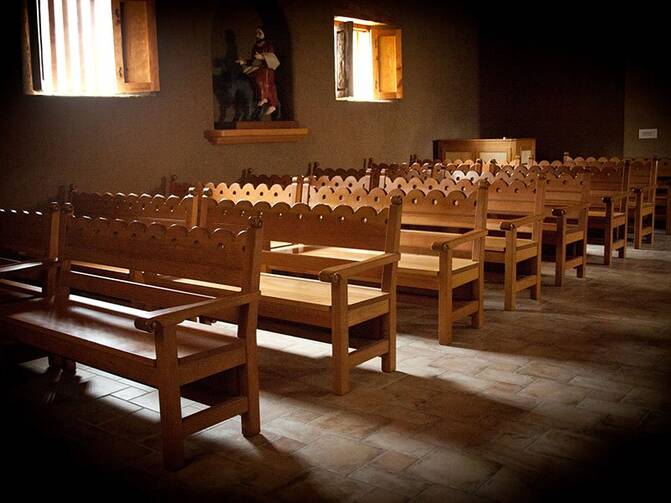(RNS) — In a shift that stands to impact both religion and politics, survey data suggests that the percentage of Americans who don’t affiliate with any specific religious tradition is now roughly the same as those who identify as evangelical or Catholic.
According to newly released General Social Survey data analyzed by Ryan P. Burge of Eastern Illinois University, Americans claiming “no religion” — sometimes referred to as “nones” because of how they answer the question “what is your religious tradition?” — now represent about 23.1 percent of the population, up from 21.6 percent in 2016. People claiming evangelicalism, by contrast, now represent 22.5 percent of Americans, a slight dip from 23.9 percent in 2016.
That makes the two groups statistically tied with Catholics (23 percent) as the largest religious — or nonreligious — groupings in the country.
The shift could signify coming political changes. Evangelicals often lean conservative and are known to have outsized influence on American elections: According to exit polls, white evangelicals alone made up 26 percent of the electorate in 2016, even as their share of the American population has dipped far below that, according to Public Religion Research Institute.
“Evangelicals punch way above their weight,” Burge said. “They turn out a bunch at the ballot box. That’s largely a function of the fact that they’re white and they’re old.”
A rising tide of religiously unaffiliated voters — a group that a 2016 PRRI analysis found skews young and liberal — could potentially offset that influence. But the same PRRI analysis also noted that religiously unaffiliated Americans do not vote in the same percentages as evangelicals, and are often underrepresented at the polls.
As such, the most immediate impact of the rise in religiously unaffiliated is likely to be felt in religious communities themselves, where their absence will be noted. Even then, those who claim “no religion” are not inherently atheists or agnostics: A 2017 Pew Research surveyfound that only 22 percent of “nones” listed not believing in God as the most important reason for their lack of religious affiliation.
But while most religious groups in the GSS survey either saw dips in affiliation or remained roughly consistent — such as black Protestants and those listed as “other faiths” — one group did see an increase: Mainline Protestants, who have been declining at a steady clip for decades, saw their numbers tick up slightly, from 10.2 percent to 10.8 percent.
Even so, Burge noted that the change is not statistically significant, and more years would have to pass to register if it signifies a resurgence among mainliners. In the meantime, he pointed to another trend: The rise of the religiously unaffiliated tracks closely with the decline of mainline Protestantism beginning in the early 1990s.
“The biggest story is that ‘no religion’ is coming from the mainline,” he said. “Mainliners are jumping ship.”











Why should one be a Catholic? Maybe the editors and authors here should try to answer this question.
I wonder how much of the increase in "nones" represents people who have long been nones, but only now feel comfortable acknowledging it. Many people have felt culturally tied to their church, whether the Catholic church or other, and would often say they were members long after they stopped participating. With a more diverse and secular society, I suspect many of those feel that they are able to acknowledge what was always the case for them. If so, the actual number of faithful hasn't necessarily decreased. In fact, the current numbers may just reflect a more accurate number.
The tone of the quotes in this article seems indignant that 'Evangelicals' turn out to vote in greater percentages, and Mr. Burge declares it's because they're white and old. The implication is that rational Americans should be appalled — or something — by all of those religious people taking part in civic government. It's just gotta be wrong! It's just gotta! Even if you really believe that, the part everyone seems to be looking past is that joiners of clubs and active members of religious congregations are the most likely sort of people, on average, to step up and take part in governing. They volunteer, contribute, show up, take part, vote, and do everything else needed to operate a democratic society far more consistently and dependably than the teeming masses of apathetic "spiritual-not-religious-I'm-not-a-joiners" that are growing in numbers every day. Of course there are exceptions, but the statistics are what they are. If you want an effective democratic society to be run efficiently, ask the busy and successful people who are already working hard in their clubs, fraternal groups, churches, and companies. They show up, and keep showing up. They keep shoveling coal when the briefly dazzling activists and noisemakers get tired and go home. And WHERE they go to church or the color of their skin has zero to do with what motivates them.
Hi Chris
I believe the writer was just pointing out a known fact that the young are notorious for voting less and always have been.
Also, there have been many states enacting laws to try and limit access to voting if you are in a minority district. This is immoral but a fact.
I am a progressive liberal and I wish my team voted like yours. That is something to be proud of not insulted by.
Well this survey is not totally accurate since if you minus our new Catholics coming from immigration to the US then you see many Catholics have left the Catholic Church and become nones. Only two years ago a large survey of nones had huge portions coming out of Catholicism. Also most of the nones I know are ex catholics and many are women so I will treat that statement with some suspicion.
I am glad for the uptick recently to mainline Protestant churches. If we don't start ordaining women priests and bishops soon I will strongly consider becoming Episcopalian.